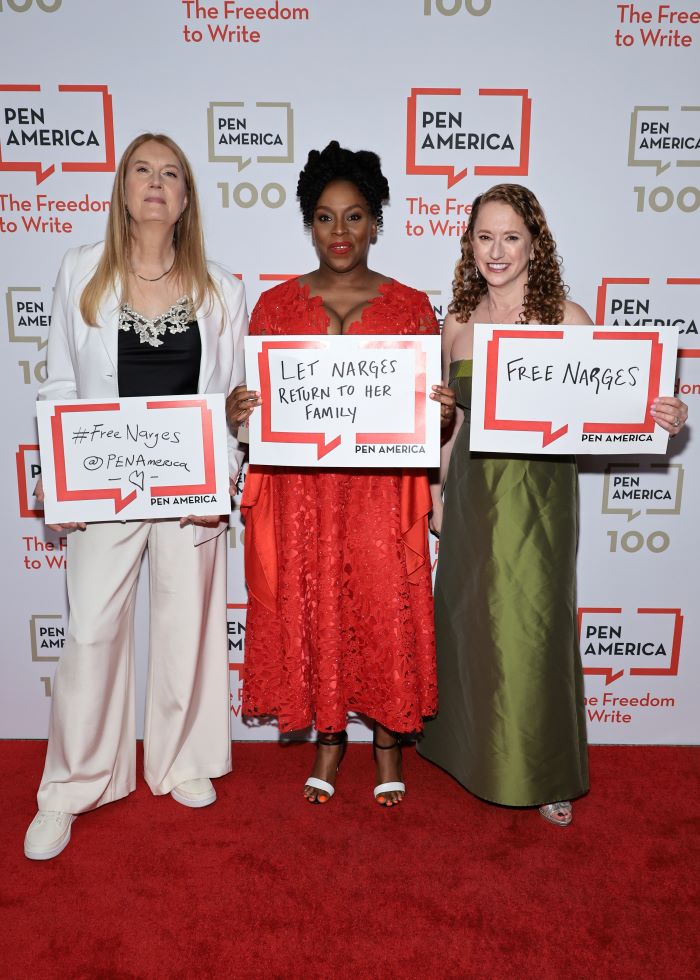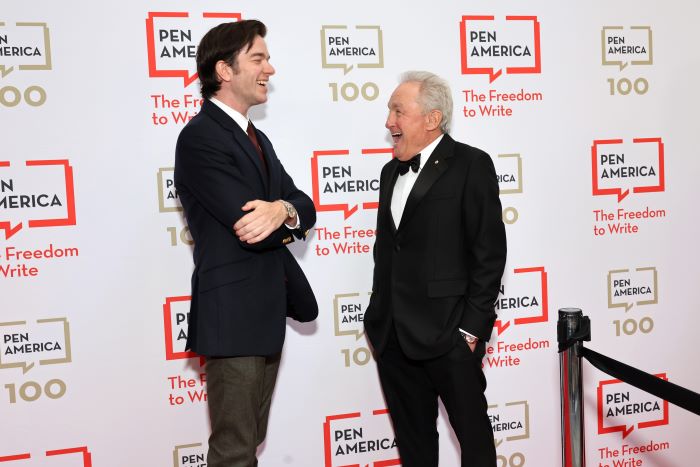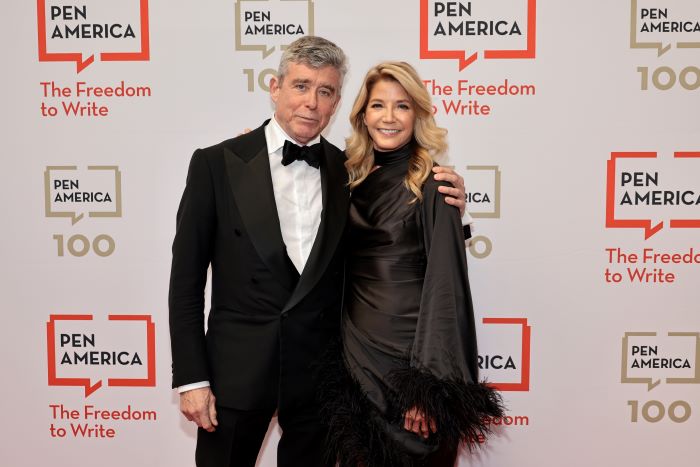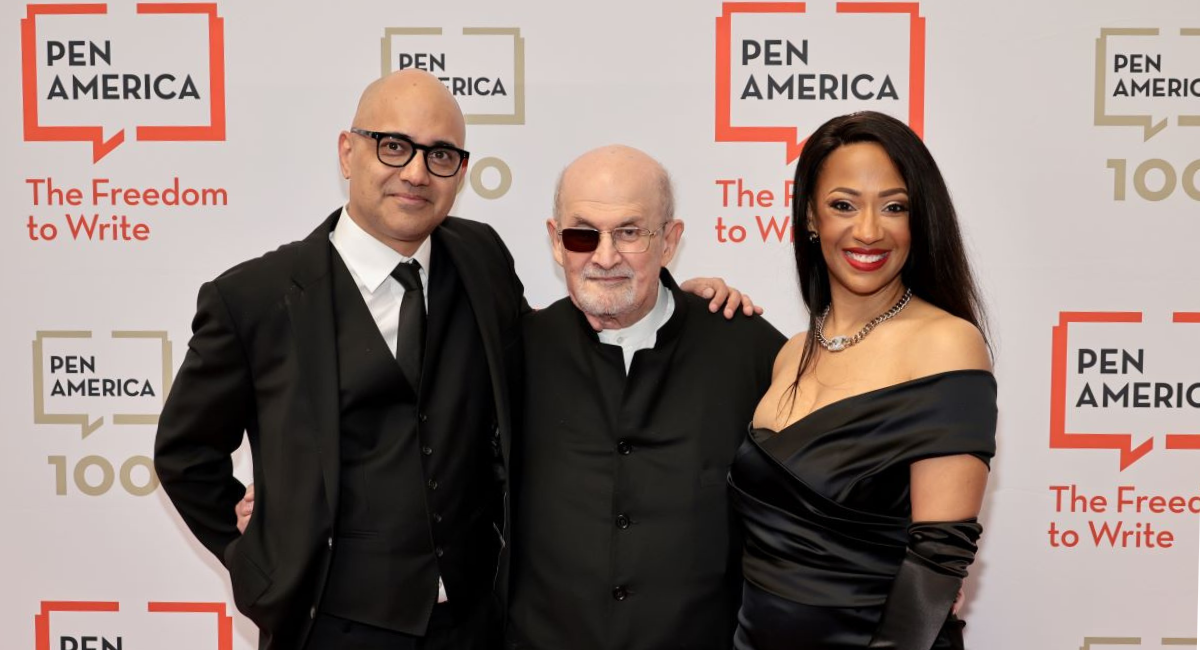Novelist Salman Rushdie roundly denounced book bans May 18 at PEN America’s annual gala at the American Natural History Museum in New York, his first public appearance since he was brutally attacked last fall.
The writer was awarded PEN’s Centenary Courage Award at the star-studded evening event, which featured Saturday Night Live’s Colin Jost, and comedians John Mulaney and Fred Armisen. Television producer Lorne Michaels and jailed Iranian writer Narges Mohammadi were also honored at the event.
Mohammadi has been imprisoned in Iran since November 2021, on charges of “spreading anti-state propaganda” and defamation. She received PEN’s Barbey Freedom to Write Award, which was accepted by her husband Taghi Ramani, who has also spent time in prison for his writing.

“All of us who have been involved with PEN have spent a lot of our lives fighting on behalf of writers in other countries,” said Rushdie in a brief speech at the gala. He served as PEN America’s president from 2004-2006.
“But right now, we face a problem in this country. And PEN has to face that problem head on, just as we have done in other countries. The attack on books, the attack on teaching, the attack on libraries in Florida has never been more dangerous, never been more important to fight,” said the acclaimed writer, who himself faced a book ban in several countries in 1988, when his seminal novel, The Satanic Verses, was published.
Rushdie has carried a $3.3 million bounty on his head for 34 years. The late Ayatollah Khomeini issued a fatwa against Rushdie in 1989; the author spent several years in hiding. Iran has since distanced itself from the fatwa, but it nonetheless remains, along with the bounty.

A day before the gala, PEN America and Rushdie’s publisher, Penguin Random House, jointly announced that they were suing Florida’s Escambia County School District and School Board for its ban on several books discussing race, racism, and LGBTQ identities.
The lawsuit states that the ban is unconstitutional, as it violates First Amendment freedom of speech rights. The ban also allegedly violates the Equal Protection Clause of the constitution: the books being banned are written primarily by non-white and/or LGBTQ authors, according to the lawsuit, which was filed in US District Court in Pensacola, Florida.
During the first half of the 2022-2023 school year, 1,477 instances of individual books were banned, affecting 874 unique titles, according to the report “Banned in the USA,” released April 20 by PEN America. More than 130 books were removed from library shelves each month during that 6-month time period, noted the report.
Book bans were most prevalent in Texas, Florida, Missouri, Utah, and South Carolina, driven by a confluence of local actors and state-level policy, noted PEN.

“What we are seeing now is a real polarization and a real heightened escalation of what should and should not be available, according to some,” said Kasey Meehan, Freedom to Read Program Director at PEN America, in an April 24 interview with Ethnic Media Services.
“Let’s hope we win. We need to win. I want to salute everybody working at PEN, working for this cause, the cause of free expression,” said Rushdie at the PEN gala.
PEN America’s current president, playwright and novelist Ayad Akhtar introduced Rushdie and referenced Nigerian writer Chimamanda Ngozi Adichie, who has spoken about the reluctance of writers and publishers currently unwilling to risk social censure.
“Could The Satanic Verses be written today?” queried Akhtar. “The answer is yes, if that writer is Salman Rushdie.”
“He continues to stand for what this organization is fundamentally all about: freedom. Freedom to think, freedom to speak, freedom to inquire, freedom to make sense of reality without deference to dogma, irrespective of the consequences. He has enlarged the world’s imaginative capacities and at such great cost to himself,” said Akhtar.



On Aug. 12 morning at the the Chautauqua Institution in Western New York, 24-year-old Hadi Matar allegedly rushed onstage and stabbed Rushdie at least 10 times, including once to the right side of his neck. Rushdie was transported by medical helicopter to the UPMC Hamot Hospital in Erie, Pennsylvania.
His agent Andrew Wylie said Aug. 12 evening: “The news is not good. Salman will likely lose one eye; the nerves in his arm were severed; and his liver was stabbed and damaged.” Rushdie has spent months in recovery, and still does not have use of one eye.
Matar has pleaded not guilty to the charges of 2nd degree attempted murder, and 2nd degree assault. In a jailhouse interview with the New York Post, the alleged assailant said he had never read Rushdie’s work but disliked him nonetheless. The case is expected to go to trial this fall.
In his speech, Rushdie praised Henry Reese, co-founder of City of Asylum Pittsburgh — which hosts persecuted and exiled writers — and others who immediately jumped on to the stage to fend off Matar.
“Henry, a man in his 70s, ran at my assailant, who was 24 years old and carrying a knife, and tackled him to the ground. Immediately after that, a substantial number of people in the front of the audience ran up to help him and jumped on top of my assailant and held him down Pinned him to the ground.”

“And if it had not been for these people, I most certainly would not be standing here today. So I accept this award. Thank you very much. But I accept it primarily on behalf of those who came to my rescue and saved my life.”
“I was the target that day, but they were the heroes. The courage that day was all theirs,” said Rushdie.
“Victory City,” Rushdie’s latest novel, was released in February by Random House. The book is set in the fictional city of Bisnaga in South India, inspired by the 14th-16th century Empire of Vijayanagara which eventually fell to Deccan sultanates.





